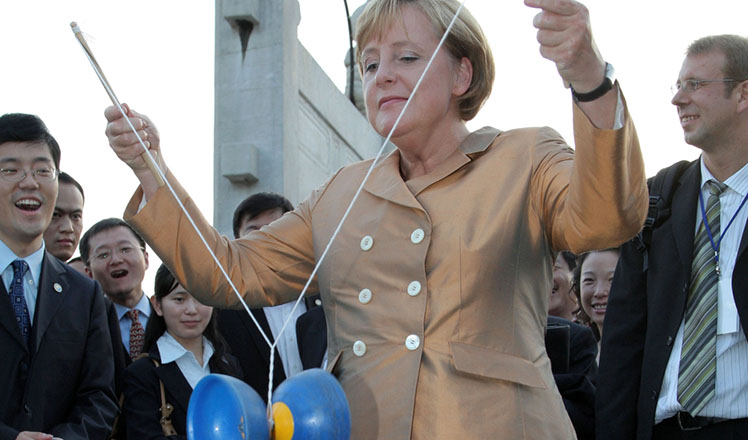Rice: Coach entrepreneurs to breed innovation
Updated: 2015-10-31 00:36
By Chen Yingqun(China Daily USA)
|
||||||||
 |
|
Condoleezza Rice delivers a speech to a forum on entrepreneurship education in Beijing last month. Provided to China Daily |
Speaking in Beijing recently, she said economic growth, for any nation, is inextricably tied to the ability to create and grow new business, and "China is coming to this understanding".
China has accomplished rapid development over the past three decades, but the country is now attempting to move away from a low-cost, export-driven growth model to one based on innovation.
To aid this transition, Rice said it was important to educate young people in entrepreneurship, not only to create new companies and resources, but also to help established companies to constantly update and keep pace with market demands.
"Innovation has become key to governance," she added, as many countries face social problems such as an aging population, urbanization and pollution, but cannot solve them by using old-fashioned methods.
"Technology is very often seen as a way to solve these problems, but technology is actually neutral. Technology is not good or bad, it is not helpful or unhelpful." It is how a technology is applied to a problem that determines whether it is successful or not, she said.
The key is to have a good idea, turn it into a solution and then commercialize it for the consumer market, she said.
Rice made the remarks last month in a keynote speech to a forum on entrepreneurship education co-hosted by the Center for China and Globalization, a think tank, and the Laureate International Universities, an international network.
Rice, who served the Bush administration between 2005 and 2009, has visited China several times, as a diplomat and as an academic with the Stanford Graduate School of Business. Last year, she became an honorary professor of Hunan International Economics University, to which she offers advice on education exchanges and cooperation.
Although more venture capitalists worldwide now "want to be a part of China's entrepreneurial club", she said it is important that the Chinese government create a healthy environment for entrepreneurs by safeguarding the rule of law and protecting intellectual property rights.
"As institutions are reformed in China, these two elements will be critical," as people today can go anywhere with an idea and they look for these qualities when choosing a location for their startup, she said.
Chinese schools looking to provide entrepreneur education also need to not only teach the core subject, she said, but also give students firsthand experience in marketplace competition as well as opportunities to share their ideas and receive feedback from industry leaders.
In US communities, Rice said it is almost taken for granted that people want to start their own business. "It's part of the ecosystem. It isn't just in the DNA, it is in the institutions, in the environment and in the way of thinking about creativity and innovation."
Not everyone can be a natural entrepreneur, she said, but with the right help from educators, anyone with an idea and passion can successfully start their own business, even people who would never normally consider the option, such as those with disadvantaged backgrounds.
However, people must also be willing to fail, she added. Not every idea is a good idea, and many companies will struggle, but budding entrepreneurs should remember the old Silicon Valley mantra about failure being a way to learn.
China has many good universities that can help generate good concepts or ideas, she said, adding that China and the US should learn from each other's education systems.
She also encouraged more American tourists and students to travel abroad, particularly to China, to learn about other nations' cultures and practices.
Those who visit should also not only stick to Beijing and Shanghai, but should visit western areas to better understand how China is developing, she added.

 Afternoon delight
Afternoon delight
 New chapter in the House
New chapter in the House
 'Hometown diplomacy' between Chinese and foreign leaders
'Hometown diplomacy' between Chinese and foreign leaders
 A Chinese cook in Afghanistan
A Chinese cook in Afghanistan
 Two Koreas hold joint football match for national reunification
Two Koreas hold joint football match for national reunification
 Merkel's lighthearted moments in China
Merkel's lighthearted moments in China
 Different shades of Western and Chinese 'ghost festivals'
Different shades of Western and Chinese 'ghost festivals'
 Top 10 news apps favored by smartphone users
Top 10 news apps favored by smartphone users
Most Viewed
Editor's Picks

|

|

|

|

|

|
Today's Top News
Tu first Chinese to win Nobel Prize in Medicine
Huntsman says Sino-US relationship needs common goals
Xi pledges $2 billion to help developing countries
Young people from US look forward to Xi's state visit: Survey
US to accept more refugees than planned
Li calls on State-owned firms to tap more global markets
Apple's iOS App Store suffers first major attack
Japan enacts new security laws to overturn postwar pacifism
US Weekly

|

|








